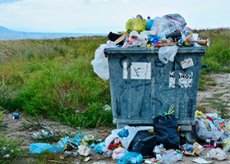New publications
A substance has been found that can degrade plastic.
Last reviewed: 02.07.2025

All iLive content is medically reviewed or fact checked to ensure as much factual accuracy as possible.
We have strict sourcing guidelines and only link to reputable media sites, academic research institutions and, whenever possible, medically peer reviewed studies. Note that the numbers in parentheses ([1], [2], etc.) are clickable links to these studies.
If you feel that any of our content is inaccurate, out-of-date, or otherwise questionable, please select it and press Ctrl + Enter.

Scientists from the UK have completed the development of a new enzyme substance that helps decompose certain types of plastic.
About two years ago, at one of the Japanese landfills, specialists discovered special microbes that can literally “eat” plastic. Moreover, this happens several thousand times faster than under natural conditions.
It took the researchers two years to synthesize the enzyme structure. As a result, the resulting substance can absorb one of the most common types of plastic – PET (polyethylene terephthalate).
Biologist Dr. John McGeehan, representing the University of Portsmouth (UK), notes that the results of the work allow us to hope for a quick solution to the problem of the ever-increasing amount of unused plastic waste.
The new enzyme substance is capable of accelerating the recycling of plastic waste by about 20%. Perhaps, it is not as fast as we would like. But the scientists are not going to stop there and will move forward, improving their discovery. At least now they understand in what direction to look for a solution to the problem.
According to statistics, every year the "reserves" of plastic in the world's oceans are replenished with 8 million pieces of plastic waste. If this process is not stopped, then in thirty years the ocean will be filled with more plastic than fish.
Scientists from the UK have been working on a solution to this problem for a long time. Not long ago, a special device called Seabin was installed in the port of Portsmouth, which is capable of “sucking out” various types of garbage from the ocean, including plastic and spilled oil products. The device created by scientists was called a “garbage can”: it consists of a pumping station, a large mesh fiber collector, and a docking station. The main function of the device is to collect waste of different sizes. The smallest particle that can get into the device’s net is 2 mm. The device works as follows: the pump unit increases the flow, which draws all floating garbage into a huge container – for example, cellophane, plastic bottles, disposable tableware, packaging, etc. In one day, the device is capable of “sucking out” one and a half kilograms of waste, and in 12 months this figure will be approximately 500 kg of garbage, which is equivalent to 20 thousand plastic bottles or 83 thousand cellophane bags.
The issue of waste disposal that clutters the world's oceans is more relevant than ever. Garbage pollutes the atmosphere, the world's waters, and causes irreparable harm to marine life. Scientists are sounding the alarm: plastic has a mechanical and physical negative impact on fish, releases toxic substances that then end up in water and human food.
The discoveries of British scientists are described on the pages of Realist.online.

 [
[